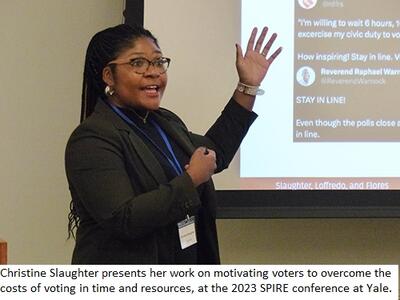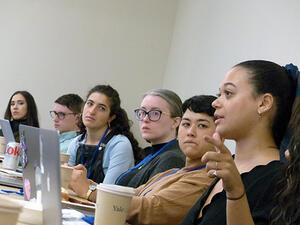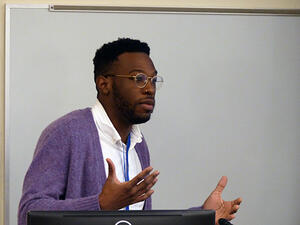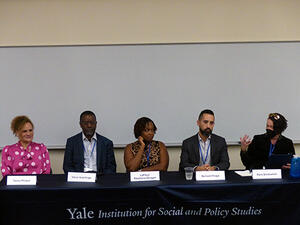SPIRE Conference Returns to ISPS: A Decade of Examining Immigration, Race, and Ethnicity

Before starting a Ph.D. program at the University of Houston, Samantha Chapa worked for a nonprofit organization to help under-resourced and vulnerable migrants with immigration matters. Having grown up in the city, she ultimately decided to return to school and study immigration systems as a tool to advocate for more equitable policies.
Last year, she came to the annual Symposium on the Politics of Immigration, Race, and Ethnicity (SPIRE) as an observer. Now in her fifth year as a graduate student, she presented her work on local inclusion policies to boost immigrant political participation.
“SPIRE is a really friendly environment,” Chapa said. “Comments are critical and constructive. And you can meet people who work on similar topics and are willing to collaborate. I’ve talked to three people today about working on a paper together.”
The Institution for Social and Policy Study’s (ISPS) Center for the Study of Inequality hosted the 10th SPIRE conference Friday, returning the event to where it began.
“We are always especially excited to feature the work of junior scholars,” said Dara Strolovitch, a faculty fellow with ISPS who co-directs the Center for the Study of Inequality with ISPS faculty fellow Allison Harris. “It’s a fabulous conference, full of great work by a range of scholars using an array of methods and addressing crucial issues in the study of the politics of race and ethnicity.”
The first SPIRE conference was held at Yale in 2012, aiming to “provide a constructively critical space in which faculty and graduate students can workshop their in-progress research on the politics of immigration, race, and ethnicity, as well as opportunities for networking and mentoring among scholars at all career stages who are working on these topics.”
In addition to hosting this year’s conference, the ISPS Center for the Study of Inequality convenes a graduate student working group, co-sponsors academic talks, and is launching a series of conversations between two authors of new books about related topics.
“As the center grows, we hope to also support and work on collaborative policy-oriented research projects,” Harris said. “The goal is to build an interdisciplinary community of scholars focused on inequality.”
This year’s SPIRE presenters covered research into methods for motivating voters to overcome the costs of voting in time and resources, how identity politics shape the public’s definition of racism, peer effects on members of the Congressional Black Caucus, whether organizations that lobby for and on behalf of racial minorities reliably represent their constituencies, the effect of economic and immigration appeals on Hispanic Americans, and assessments of the diverse political preferences of Hispanic Americans.
“I think this field has grown in prominence and importance,” said LaFleur Stephens-Dougan, an associate professor of politics at Princeton who helped organize this year’s conference. “With everything that is happening around the country socially and politically, people see the need to explain it. And that means thinking about how race and ethnicity are shaping these events.”
Bernard Fraga, an associate professor of political science at Emory University, attended the first SPIRE as a graduate student before signing on to help organize it six years later. Other current organizers are Jamil S. Scott of Georgetown University and Yamil Velez of Columbia University.
“When SPIRE began, there weren’t that many scholars on race, ethnicity, and politics on the East Coast,” he said. “We didn’t have robust structures for collaborating or even just highlighting the work.”
Now, he said, organizers and participants have built a sustainable model to make sure new voices are heard and cultivated from across the country.
“This has continued to be a topic of great interest,” Fraga said, noting the conference’s format involves short presentations with long periods for audience interaction. “Scholars present their work, learn from their peers, and are in turn exposed to research going on at other institutions.”
In addition to Chapa, presenters included Christine Slaughter and Joseph Loffredo of Boston University, Alejandro Flores of the Massachusetts Institute of Technology, Steven Moore of Wesleyan University, Hunter Rendleman of Harvard University, Nhat-Dang Do of Trinity College, Kenicia Wright and Gunes Murat Tezcur of Arizona State University, and Derek Wakefield of Emory University.
Panelists included Fraga, Stephens-Dougan, Strolovitch, Vincent Hutchings of the University of Michigan, and Tasha Philpot of the University of Texas, Austin.
Chapa said that even in a city as large as Houston, there are not necessarily a lot of people researching race, ethnicity, and politics.
“It’s always fun to talk to like-minded people,” she said. “I will definitely be back next year.”